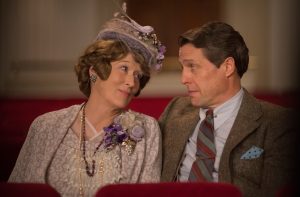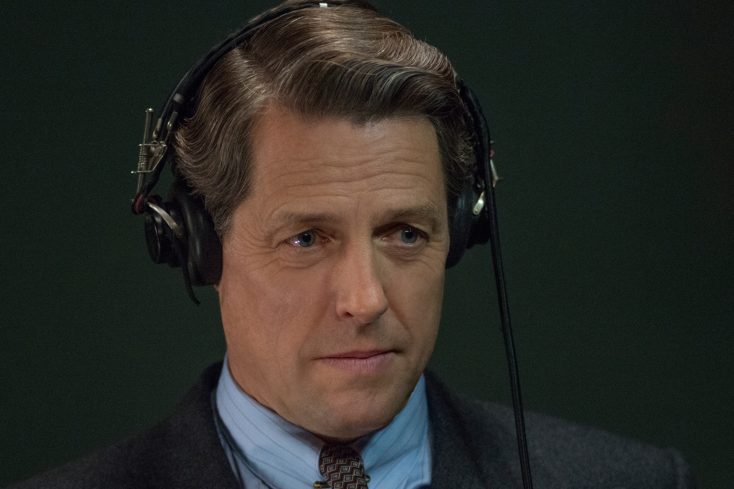
Meryl Streep as Florence Foster Jenkins and Hugh Grant as St Clair Bayfield in FLORENCE FOSTER JENKINS by Paramount Pictures, Pathé and BBC Films
By ANGELA DAWSON
Front Row Features
HOLLYWOOD—A fixture of late 20th century and early 2000s Hollywood rom-coms, Hugh Grant has distanced himself from the limelight in recent years to focus on politics and social issues back home in England.
The still dashing 55-year old was coaxed back to Hollywood by renowned filmmaker Stephen Frears (“The Queen,” “Dangerous Liaisons”) with a role in his seriocomic biographical film “Florence Foster Jenkins,” starring three-time Oscar winner Meryl Streep in the title role.
Set in 1944 New York, Grant plays St. Clair Bayfield, a British ex-pat devoted to his much older and very rich American common law wife. Florence (Streep, made up to look older and heavier) is an aging New York socialite who contributes generously to the arts, who one day decides she wants to be an opera singer. Though Florence can barely carry a tune, Bayfield indulges her, arranging for singing lessons, hiring a pianist and then providing a paid audience (including friendly critics) to attend a performance. While Bayfield initially manages to contain the ruse, eventually things get out of control when Florence records an album and copies of the disc end up in the hands of a less-than-kind public. His motives are both self-serving and out of respect for his mate, who is oblivious to her own inability to sing. His biggest hurdle comes when Florence decides she wants to perform a free concert for hundreds of soldiers at prestigious Carnegie Hall.
Grant, a father of four from two different relationships has been busy lately not only expanding his family, but also campaigning in England to tighten laws against paparazzi from invading the privacy of victims of horrific crimes and their families. No stranger to the paparazzi himself, the actor/activist has discovered that speaking out (and speaking up) against the Fifth Estate also has its challenges. During an interview, he spoke candidly about returning to the big screen and working with his much revered leading lady as well as his connection to a U.S. Presidential candidate.
Q: You stepped away from show business to enter politics in England. What did director Stephen Frears say to you to get you to be in this film?
Grant: Well, that’s right. I had kind-of drifted off into other areas of life and one of them was politics and one of the supporters of the campaigns I was involved in is Stephen Frears. He used to show up and say, “Let’s do a film. Let’s go back to show business, Hugh.” And I always thought it was the drink talking (He laughs.) Then one day he sent this brilliant script and Meryl Streep was attached and I thought, “I don’t really want to do more acting, but this is such a good project, and so classy, I can’t say no.” So I said yes and I’m very glad I did.
Q: St. Clair Bayfield has an interesting relationship with journalists in this film, where he basically pays them off, certain ones, to come in and be polite and say nice things about her in the papers. Your disdain for critics is well known. At this point in your career, do you look at reviews or did you ever read your reviews? Did they make or break how you felt? Did you take it personally if it was good or bad?
Grant: Well, yes. I did look at them and I do look at them and I do take it personally.
Q: To this day?
Grant: Yes, of course.
Q: As an actor, do you feel you’re always being judged performance after performance? Don’t you feel like you’ve earned some credit for having delivered some great work in the past?
Grant: Well, maybe, but I think it’s perfectly fair to judge everyone on a case-by-case basis. It’s amazing. You see really brilliant actors suddenly taking the wrong road and being appalling. It’s quite fun, really.
Q: So how do you deal with bad reviews? Do you just brush them off or do you take it to heart and say to yourself, “Well, next time I’ll do this?”
Grant: Well, I have tendency, through some weird warped British masochism to skip over the good ones and read the bad ones with great interest. I allow them to cast me down for a bit.
Q: Was it on your bucket list to work with Meryl Streep? What was the reality like versus what you imagined?
Grant: I think it was a little bit like how I imagined, actually. I was terrified. I thought she’s got this ridiculous talent and this extraordinary kind of devotion to her craft, and that’s exactly how she was, and it is intimidating. I thought, “I’m going to have to raise my game,” and I had to try to raise my game, yeah.
Q: Had you heard of the true story of Florence Foster Jenkins prior to being a part of the film?
Grant: I knew of her vaguely because people used to pass around cassettes of her singing. It was like a viral thing, pre-Internet.
Q: What did you make of her?
Grant: The historical character or our character in the film? Because I don’t think they’re exactly similar. I think the historical character may have been more of a monster. That’s my personal belief. Meryl (Streep) may well disagree. I think the real Florence was more of an egotistical monster, but the character in our film, there’s certainly egotism there and the love of the limelight, but it’s sufficiently offset by her passion for what she does and her passion for music. The passion for anything is always enduring and sympathetic, I think.
Q: What about her relationship with her husband? Did you know anything about their relationship?
Grant: In many ways, they were crazy and delusional egotistical nutters.
Q: Your character is somewhat of an enabler. Florence gets to the position where she thinks she’s great at singing but she’s really not and yet Bayfield keeps making sure that she thinks she is. As a parent, how do you make sure you encourage your kids without giving them false hope?
Grant: Are you asking me for parenting advice? (He laughs.)
Q: Florence nearly discovers the sad truth about her singing ability. Have you ever stepped in front of a camera or on stage and had a reception that was completely different than the one you had anticipated?
Grant: Not yet, but it will come. I’ve never stepped out there and had people roar with the wrong kind of laughter. There was one time in school, actually, when I had to sing and I started off-key and I never really got over that. I got jeers and boos from 500 boys, but nothing on her scale.
Q: Politics versus. the acting world—were there some surprises when you went into the other direction and do you feel like you can balance both now?
Grant: Well, it was bracing to go into the other world, where there’s absolutely no ass-licking at all. Quite the reverse, it’s brutal. There’s no script. You are out there on national television arguing a point on the BBC or whatever against some quite brutal opponents and suddenly it’s bracing. I did feel quite butch—manly—at the end of the day too.
Q: What do you make of the American presidential campaign?
Grant: Well, obviously it’s wonderful theater. We’re all enjoying it.
Q: Are you a little nervous or are you confident in how the election will go in November?
Grant: You would have to tell me. I’m dying to know if there’s really a chance (Donald) Trump could become a president. You have to remember he was my co-star in ‘Two Weeks Notice.” (He laughs.) We did a scene together. I have to say he was really nice to me. He made me a member at one of his golf clubs afterwards. So if he does become President, I suppose that at least we’re chums.
Q: In the film, Florence, despite not being able to sing, supports the arts community. Do you see your contributions to the arts and politics as a way to kind-of cultivate a better understanding of what people want to do culturally or as a society? You have a perspective of a storyteller. Do you bring that with you when you go into politics?
Grant: No, I don’t think so. I don’t know what I bring really. I’m not a bad communicator. I’m reasonably good in interview situations. I can do that. The only other thing I bring is I can get onto these big political shows, but in the case of my particular campaign, that’s a double-edge sword because my campaign is really about protecting non-show business people, particularly vulnerable people who’ve suffered traumas from press intrusion.
Q: Maybe this was in the backstory you created for yourself from what you gleaned from the Bayfield’s journals, but do you believe he started out as the gold digger when he met her and then grew to love her or some variation, thereof?
Grant: My suspicion in terms of the real character certainly was that because they were together for like 35 years, I’m sure there was a huge element of self-interest when this penniless, unsuccessful actor without much family, lost in the world, is scooped up by a millionairess and given position, a lovely suit and a place to live. I’m sure there was self-interest there, just as there was self-interest on her part. I think it was a great look for her, along with her jewelry, costumes and her hats, to have an aristocratic Englishman on her arm. They both loved the limelight. He was an actor; she was a singer. I think it suited them. They thought, “Well, we’re rather a glamorous couple.” But I think they were together so long, doing their loony stuff for so long, that they became passionately fond of each other. They were blood and they would have protected each other until the end of the world.
Q: Are you working on another film or is this it for now?
Grant: This is it for now, but there’s a couple things dangling in front of me. I don’t know whether I’ll reach and pull up and eat them.





